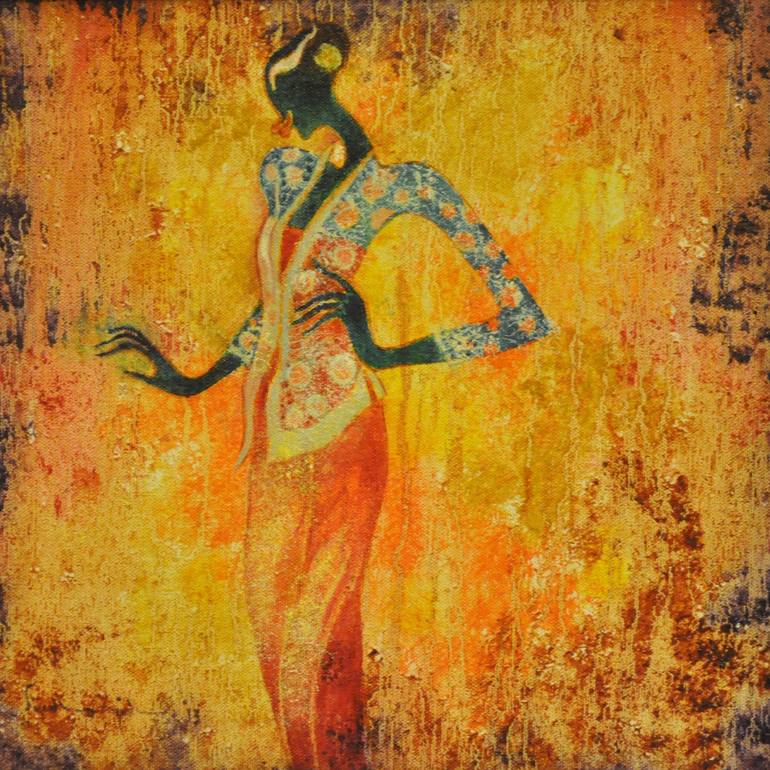


1659 Views
7
View In My Room
Painting, Oil On Canvas on Other
Size: 12 W x 12 H x 1 D in
Ships in a Crate
1659 Views
7
ABOUT THE ARTWORK
DETAILS AND DIMENSIONS
SHIPPING AND RETURNS
The Kebaya, a traditional Malay dress is commonly worn by the women in Malaya in the early 50s. The depiction of ladies adorning the Kebaya is one of his more popular themes. Most of the paintings in this series are miniatures, a clear departure from his bigger or mural sized paintings. The artist ...
Year Created:
2013
Subject:
Styles:
Mediums:
Mediums:
Painting, Oil On Canvas on Other
Rarity:
One-of-a-kind Artwork
Size:
12 W x 12 H x 1 D in
Ready to Hang:
Not Applicable
Frame:
Not Framed
Authenticity:
Certificate is Included
Packaging:
Ships in a Crate
Delivery Cost:
Shipping is included in price.
Delivery Time:
Typically 5-7 business days for domestic shipments, 10-14 business days for international shipments.
Returns:
14-day return policy. Visit our help section for more information.
Handling:
Ships in a wooden crate for additional protection of heavy or oversized artworks. Artists are responsible for packaging and adhering to Saatchi Art’s packaging guidelines.
Ships From:
Malaysia.
Need more information?
Need more information?
Syed Thajudeen
Malaysia
Syed Thajudeen Shaik Abu Talib was born in 1943 in Alagan Kulam, a village not too far from the temple city of Madurai, South India, where his Malaysian-born parents lived during the Second World War. He joined his family in Penang when he was eleven years old but later went back to India to pursue a course in art at the Government College of Arts and Crafts, Madras (1967-1974). Without doubt, Syed's unique style and aesthetic sense draw inspiration from his personal Indian background and Indian traditional painting styles fused with Malay cultural elements. Syed's studies at Madras College of Arts and Crafts also informed and influenced his sense of aesthetics. A distinctive stylisation, romantic treatment of subject matter and the rich colours as in the Ajanta cave paintings of Maharasthra and of the Mughal (enriched from the wealth of Indian mythology) are apparent in his works. This, together with the traditional visual arts' integral connection with literature, music, dance, sculpture and philosophy, helped shape Syed's early works. His works, as individualistic as they are, attempt to evoke a state of rasa, or heightened mood that belongs to a larger tapestry and sensibility of Asian artistic traditions. In many instances where his favourite subject matters deal with women and love, they share the same archetypal symbols and metaphors. Syed's impressionable days spent at the Madras College of Arts and Crafts had a profound influence on his search for artistic style and identity. Baroda, Calcutta and Madras were at the time rife with new ideas, experimentations and soul-searching discussions by the pioneering figures of India's post-independence visual artists. These artists were struggling to establish their individualistic styles. At the same time, they felt compelled to learn from the larger vehicle of Indian traditional arts that ubiquitously permeate the life of the masses in India. A larger number of these early figurative contemporary painters of India, found the rich tapestry of the Indian tradition, a source of inspiration as well as a point of embarkation for their own contemporary approach. These pioneering protagonists of India's visual arts had a deep impact on Syed Thajudeen's early paintings. On returning to Malaysia, however, Syed soon established his own individualistic style and expression that transformed the early Indian influences into what is now his present style, an amalgamation of cultural elements and metaphors.
Why Saatchi Art?
Thousands of
5-Star Reviews
We deliver world-class customer service to all of our art buyers.
Global Selection of Original Art
Explore an unparalleled artwork selection from around the world.
Satisfaction Guaranteed
Our 14-day satisfaction guarantee allows you to buy with confidence.
Support Emerging Artists
We pay our artists more on every sale than other galleries.
